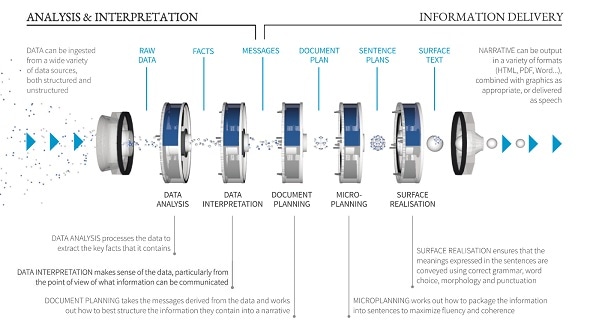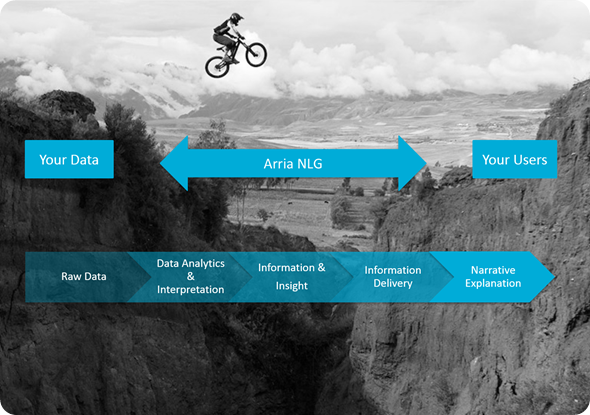Artificial Intelligence has made huge advances in recent years in many areas, including language processing, vision, and machine learning; we are also seeing the emergence of platforms that integrate different kinds of AI, such as IBM Watson (Arria is a Watson ecosystem partner).
Within medicine, I see a lot of excitement about using many aspects of AI; of course Natural Language Generation (NLG), but also using predictive analytics to anticipate potential problems, using machine learning to build diagnostic algorithms, using natural language processing to identify relevant research findings, using computer vision to analyze scans, and using robotics to assist surgeons and other clinicians.
What is natural language generation (NLG) and how does it work?
Natural Language Generation (NLG) software systems generate narratives that summarize, explain, and communicate complex data sets to people.
The huge amount of data available in the modern world can overwhelm people; NLG humanizes the flood of data so that it helps rather than overwhelms people.
NLG systems use data analysis and artificial intelligence techniques to analyze complex data sets, and computational linguistic techniques to communicate the results of the analysis in a high-quality narrative text.

In what ways could NLG be used in healthcare?
NLG is being used in many ways in healthcare, including:
- Decision support: explaining and summarizing data, in order to help clinicians make decisions
- Report writing: automating reporting writing tasks, in order to save clinicians time and enhance consistency in reports
- Patient information: giving patients personalized information about their health
- Behavior change: encouraging people to change their behavior (e.g., smoking, diet, compliance)
What will NLG mean for patients?
NLG can be used to empower patients, so that they understand their medical conditions and can make better choices about their healthcare. NLG can also help patients do a better job of looking after themselves: this includes lifestyle changes, self-management of chronic conditions, and complying with treatment regimes.
For example, many diabetics have sensors which measure blood sugar levels, but they struggle to use this information to manage their diabetes because often they don’t understand it, and can overreact and indeed panic when they see their blood sugar change. An NLG system can explain and contextualize any changes in blood sugar and help diabetics respond appropriately.
In what ways do you think NLG will impact the doctor-patient relationship?
NLG empowers patients by giving them a better understanding of their health and healthcare choices. Ideally this strengthens the doctor-patient relationship, by making it easier for doctors to have informed discussions with patients.
However, I have seen cases where doctors felt threatened by NLG-empowered patients. In other words, NLG can strengthen the doctor-patient relationship *if* the doctor wants his/her patients to be knowledgeable and empowered; sadly this is not always the case.
What feedback have you received so far on NLG in healthcare?
Clinicians are keenest on report-automation tools, because they see major benefits for themselves as both report authors (automation saves them time) and report readers (automation means more consistent reports with fewer mistakes and omissions). I have worked on several systems in this area, mostly producing handover reports (nursing shift handover, first responder to paramedic handover), and know of many other NLG projects in this area.
I think there is a lot of potential in using NLG for clinical decision support, and indeed there is plenty of evidence that the way clinicians currently look at data (via visualizations or tables) is sometimes not very effective; and that textual summaries can help decision-making, in part by highlighting important information which is not obvious in the visualization. But in all honesty it is often easier to “sell” report-writing automation to clinicians than decision-support.
I personally am most excited about using NLG to empower and support patients. There is a lot of interest in this now (not least because of the spread of mobile-health apps on mobiles and tablets). Watch this space!
What influence do you see Google DeepMind having on artificial intelligence in healthcare?
The medical applications I have seen so far from DeepMind have been worthy and useful, but not revolutionary.
What are Arria NLG’s plans for the future?
Arria’s mission is to be the world leader in commercial NLG technology. At the moment, we are putting a lot of effort into making our NLG toolkit available to outside developers, so that clients and third-party developers can license Arria’s NLG technology and use it to develop their own NLG solutions.

Where can readers find more information?
The best source of information about Arria is its homepage, www.arria.com. I also encourage people to read the Wikipedia entries on Natural Language Generation (I wrote 80% of these).
People who want more technical depth can read my book, Building Natural Language Generation Systems (Cambridge University Press); it’s a bit dated (published in 2000) but I think still reasonable for explaining basic concepts.
About Dr. Ehud Reiter
Ehud Reiter is the Chief Scientist of Arria NLG and also a Professor of Computing Science at the University of Aberdeen. He has a BA and PhD from Harvard University (USA). He has worked in Natural Language Generation since the late 1980s, and in his academic role is one of the most respected and citied authors in NLG. Arria NLG essentially grew out of a spinout company which Prof. Reiter and Dr. Sripada (Arria’s Chief Development Scientist) founded in 2009 to commercialize their research.